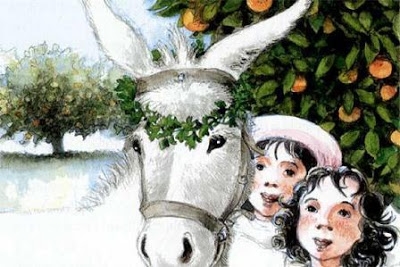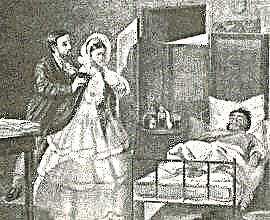This is a love story told by a heroine named Fiametta, addressed primarily to women in love who have a young lady looking for sympathy and understanding.
The beautiful Fiametta, whose beauty captivated everyone, spent her life in a continuous celebration; a loving spouse, wealth, honor and respect - all this was bestowed on her by fate. Once, on the eve of a great celebration, Fiamette had a terrible dream, as if she was walking on a nice sunny day in a meadow, weaving wreaths, and suddenly a poisonous snake stings her under her left breast; right away the light fades, thunder is heard - and awakening sets in. In horror, our heroine clutches at a bitten place, but, finding him unharmed, calms down. On this day in the temple during the festive service of Fiametta, she truly falls in love for the first time, and her chosen one Panfilo reciprocates her sudden outburst of feeling. There comes a time of bliss and pleasure. “Soon the whole world became indifferent to me, it seemed that I was heading for heaven,” admits Fiametta.
The idyll is violated by unexpected news received from father Panfilo. The widowed elder asks his son to come to him in Florence and become a support and comfort at the end of his life, since all the Panfilo brothers died and the unfortunate father was left alone.Fiametta, inconsolable in her grief, is trying to keep her lover, calling for his pity: “Will you, if you prefer pity to the old father, legitimate pity for me, will you cause my death?” But the young man does not want to incur cruel reproaches and dishonor, so he sets off, promising to return in three to four months. When parting, Fiametta is deprived of feelings, and half-dead from grief, the maid tries to console her with her story about how Panfilo sobbed and kissed the face of the lady with tears and begged to help his beloved.
Fiametta, the most faithful of the women in love, is waiting for the return of her beloved with an obedient faith, but at the same time jealousy creeps into her heart. It is known that Florence is famous for lovely women who know how to lure into their networks. What if Panfilo is already caught in them? Fiametta, suffering, drives these thoughts from himself. Every morning, she rises to the tower of the house and from there watches the sun, and the higher it is, the closer it seems to her the time Panfilo returns. Fiametta constantly mentally talks with her lover, reads his letters, goes through his belongings, and sometimes calls the maid and talks to her about him. Day consolations are replaced by night consolations. Who would believe that love can teach astrology? Fiametta could definitely tell by the change in the position of the moon what part of the night had passed, and it was not clear what was more pleasant: to observe how time was passing, or, being busy with another matter, to see that it had already passed. When the deadline promised by Panfilo returned, the lover decided that she should have some fun so that the beauty somewhat erased by sorrow would return.Luxurious outfits and precious jewelry have been prepared - so the knight prepares the armor he needs for a future battle.
But there is still no lover. Fiametta comes up with excuses: maybe his father begged him to stay longer. Or something happened along the way. But most of all, Fiametta was tormented by jealousy. “Not a single worldly phenomenon lasts forever. "The new is always more like than the seen, and always the person is more desirous of what he does not have than of what he possesses." So a month passed in hope and despair. Once, during a meeting with the nuns, Fiametta met a Florentine merchant. One of the nuns, young, beautiful, of noble birth, asked the merchant if he knew Panfilo. After receiving an affirmative answer, she began to question in more detail, and then Fiametta found out that Panfilo was getting married. Moreover, the nun blushed at this news, lowered her eyes, and it was evident that she could hardly hold back her tears. The shocked Fiametta still does not lose hope, she wants to believe that it was her father who made Panfilo marry, but he continues to love her alone. But she no longer wants to look at the sky, since she is no longer confident in the return of her beloved. In a fit of anger, letters were burned and many of his things were spoiled. The once beautiful face of Fiametta turned pale, the marvelous beauty faded, and this brings despondency to the whole house, gives rise to various meanings.
Her husband, anxiously watching the changes taking place with Fiametta, offers her a trip to the waters, healing from all kinds of ailments. In addition, those places are famous for their fun and sophisticated society.Fiametta is ready to fulfill the will of her husband, and they hit the road. But salvation from love fever does not exist, especially since it was precisely in these places that Fiametta visited Panfilo more than once, so the surging memories only agitate the wound. Fiametta takes part in various entertainments, with feigned tenderness watches the couples in love, but this serves only as a source of new torment. The doctors and her husband, seeing her pallor, considered the disease incurable and recommended that she return to the city, which she did.
Our heroine happens to sit in a circle of women leading conversations about love, and, eagerly listening to these stories, she realizes that there was not and there is no such ardent, so secretive, so woeful love as hers. She turns to Fate with prayers and requests to help her, to protect her from blows: “Cruel, take pity on me; look, I’ve gotten to the point where I became a byword where I used to be praised for my beauty. ”
A year has passed since Panfilo left Fiametta. Suddenly, a servant of Fiametta returns from Florence, who says that it was not Panfilo who married but his father, Panfilo fell in love with one of the Florentine beauties. Fiametta, not being able to endure treason, is trying to commit suicide. Fortunately, the old nurse guesses the intent of her pet and stops her in time when trying to throw herself from the tower. From hopeless grief, Fiametta is seriously ill. The husband is explained that the despair of the wife is caused by the death of her beloved brother.
At some point, a glimmer of hope appears: the nurse reports that she met a young man on the waterfront of Florence who seems to know Panfilo and assures him that he is about to return. Hope resurrects Fiametta, but joy is in vain.Soon it turns out that the information is false, the nurse was mistaken. Fiametta falls into her former longing. Sometimes she tries to find solace in comparing her torment of love with the torments of famous jealous women of antiquity, like Fedra, Gekuba, Cleopatra, Jocasta and others, but finds that her torment is a hundred times better.




 Criminal mother
Criminal mother






